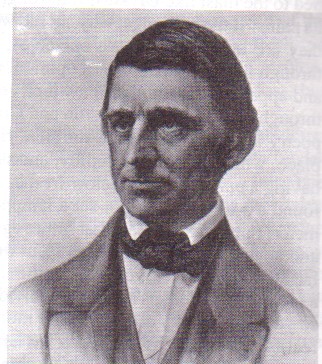|
● Early
Fiction
● Transcendentalists
● Power
of Imagination
● New
Visions of America
● Reform
and Liberation
● Regionalism
● A
New Wave
● Sympathetic
Views
● Rebellious Spirit
● The
Modernists
● The Lost Generation
● Harlem Renaissance
● New
Drama
● Depression,
Realism and Escapism
● Postwar Voices
and the "Beat Generation"
● New American
Voices
Transcendentalists
 The
country was expanding westward, but in the older cities of the northeastern
states—still referred to as "New England"—the influence
of early Puritan teachings remained strong. However,
such authoritarian religious organizations inevitably produce dissenters.
In 1836, an ex-minister named Ralph
Waldo Emerson (1803-1882) published a startling
book The
country was expanding westward, but in the older cities of the northeastern
states—still referred to as "New England"—the influence
of early Puritan teachings remained strong. However,
such authoritarian religious organizations inevitably produce dissenters.
In 1836, an ex-minister named Ralph
Waldo Emerson (1803-1882) published a startling
book
 |
|
Emerson
|
called Nature. In this volume, Emerson
claimed that by studying and responding to nature individuals could
reach a higher spiritual state without formal religion.
For the next several years, Emerson's essays made him extremely
influential, not only upon other thinkers and writers, but upon
the general population as well, thanks
to growing popular lecture circuit that brought controversial speakers
to small towns across the country. In effect, Emerson's
lectures were like sermons,
with their direct, motivating language. In his poetry, Emerson developed
a free-form, natural style, using symbols
and imagery
drawn from nature. His work had an immense
impact on other poets of the time.
 A
circle of intellectuals who were discontented with the New England
establishment soon gathered around Emerson. They were known
as "the Transcendentalists,"
based on their acceptance of Emerson's theories about spiritual
transcendence. One of Emerson's most gifted fellow-thinkers
was Henry David
Thoreau (1817-1862). A
circle of intellectuals who were discontented with the New England
establishment soon gathered around Emerson. They were known
as "the Transcendentalists,"
based on their acceptance of Emerson's theories about spiritual
transcendence. One of Emerson's most gifted fellow-thinkers
was Henry David
Thoreau (1817-1862).
 Thoreau
was passionate about individuals' learning to think for themselves
and being independent, both traditional American values. He carried
out this ideal by going to live by himself for two years in a simple
cabin
beside a wooded
pond, where he survived essentially by his own labor and meditated
in solitude.
The book he wrote about this experience, Walden, was published
in 1854, but many of its statements about the individual's role
in society—simply put, that
the dictates of an individual's conscience should take
precedence over the
demands, even the laws, of society—sound radical even
today. Thoreau
was passionate about individuals' learning to think for themselves
and being independent, both traditional American values. He carried
out this ideal by going to live by himself for two years in a simple
cabin
beside a wooded
pond, where he survived essentially by his own labor and meditated
in solitude.
The book he wrote about this experience, Walden, was published
in 1854, but many of its statements about the individual's role
in society—simply put, that
the dictates of an individual's conscience should take
precedence over the
demands, even the laws, of society—sound radical even
today.
Previous Page Next
Page
|

